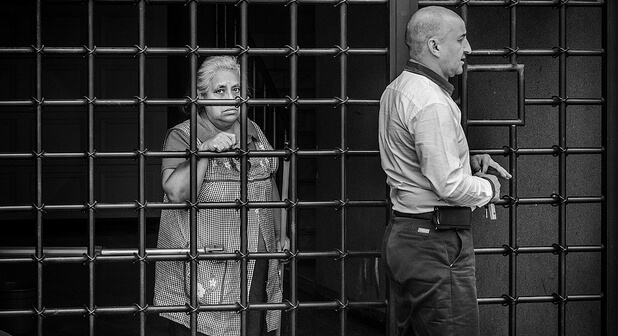In November 2001, I received a verdict that felt like a prison sentence. I discovered that the baby I was carrying had a disability. The geneticist that gave me the diagnosis recommended that I terminate the pregnancy.
I didn’t want to have an abortion yet. I was overwhelmed by the fear of the unknown that grew inside of me. The decision to give birth to a child with a disability thrust me into messy, chaotic moments of uncertainty that chained me to an unfolding diagnosis that I had no control over. The commitment to be a mom to this child set prison walls for my life. In my head, I knew this was the right thing to do, but in my heart I was convinced that I had no idea what I was doing. I mentally checked into a prison.
A prison is a place where no one wants to go. A prisoner has no control over their life. Every minute they are told what to do, what to wear and where to go. A prisoner is a person who is under the control of the state. They no longer belong to themselves. They belong to someone else.
I stepped into a life that I didn’t want that made me go places I didn’t want to go and meet people I never wanted to meet.
One woman who learned of my predicament said if she could pick a child with a disability to take care of, she would pick the disability that marked my daughter. Taking care of children with disabilities was her job; not a 24-hour, 7-days-a-week responsibility that consumes you. While she encouraged me for a moment, her words faded in the years of constant change. I belonged to the demands of a daughter with special needs that meant lots of meetings with doctors, specialists, special education teachers, paraprofessionals, therapists and counselors.
My husband, Jerome, and I are members of a church that encouraged us as much as they knew how to. When she was a baby up to 3 years old, she was in the Infant Toddler Ministry and blended in with the rest of the children. At 4-years-old, she was in the service until after worship. The decibel level of the worship band was painfully loud for D’Andra. That period of worship, which is what I loved the most about this church, was spent walking her back and forth in the foyer until she went into the children’s ministry.
When a child is 6-years-old, they are in the whole service. D’Andra’s aversion to the decibel level that caused her to cover her hears and cry didn’t end. I spent the next three years in the foyer with her. I wondered if I should even go to church since I spent most the time during the service in the foyer.
Jerome was insistent that I go even though he knew that D’Andra wanted me to be in the foyer with her. At that time, I also had to step out of being a “prayer warrior” and other volunteer activities to take care of her. I struggled with feelings of being worthless, useless, forgotten and overlooked. I was so busy taking care of D’Andra that I couldn’t live up to other people’s expectations. My pool of friends shrank and I felt isolated and alone in a fight that I didn’t want to be in. I knew I had no control so I leaned into the isolation and loneliness and quit running from it or resenting being in that cave. Leaning into the isolation and loneliness while praying and depending on Him alone set me free from the drive to be recognized or approved by people.
I found freedom from the need for attention when I had to leave church early many times to care for D’Andra. I found freedom from the facade of ‘having everything together’ when my struggle with her was apparent to everyone. One time she slipped away and the ushers put the church on lock down during the service. A massive manhunt for this little girl who wouldn’t stay in one place took place while my friends sang songs to God inside the church.
An usher found her hiding behind a glass pulpit in the Media Room. She giggled when she was found. I wanted to scream, but her laughs and hug around my neck melted me. I found freedom to be vulnerable, to scream, to be outraged, to cry and to break walls down when I either wanted to kill myself or flee. I found freedom to reach out for help from trusted friends.
I found freedom to fail with endless mornings where she refused to get on the bus. There were morning meltdowns as she screamed at me. I lived in this war zone for years until she turned 13. Today, she gets on the bus without any problems. But there were many mornings of scrambling to get her into the car to drive her to school. Promising her a doughnut on the way so I could get her in the car for school. Yes, I failed as mom because I had to use sugary, high-calorie doughnuts to bribe her to go to school. I learned to find peace in God when failure screamed at me.














































